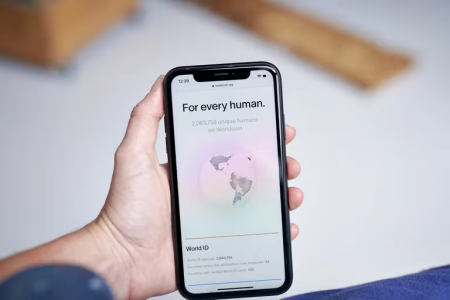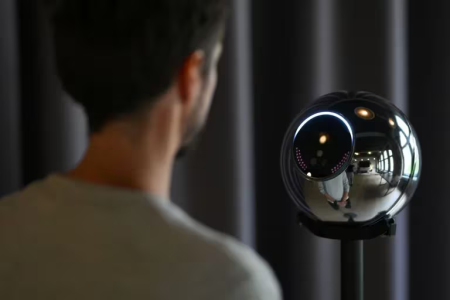All the Answers
Well-known member
The CEO of Worldcoin visited Argentina and the lobby advances to extend the dangerous iris scanning in exchange for money - Infobae

Source:

El CEO de Worldcoin visitó la Argentina y avanza el lobby para extender el peligroso escaneo de iris a cambio de dinero
La compañía, que ya fue prohibida en España y Portugal, paga en criptomonedas a quienes ofrecen sus datos biométricos. Busca expandirse en economías golpeadas donde es más fácil encontrar personas dispuestas a someterse al procedimiento
May 03, 2024
The company, which has already been banned in Spain and Portugal, pays those who offer their biometric data in cryptocurrencies. It seeks to expand in hard-hit economies where it is easier to find people willing to undergo the procedure

The Worldcoin website on a smartphone arranged in Germantown, New York, USA, on Monday, July 24, 2023. Photo by: Gabby Jones - Bloomberg
The lobby of the controversial application that scans people's irises in exchange for cryptocurrencies landed in Argentina . Alex Vania, CEO of Tools for Humanity, the blockchain platform behind Worldcoin , was in the country this week and held meetings with leaders from different fields, including Demian Reidel , a member of President Javier Milei's Council of Advisors.
After being banned in Spain, Portugal and France , the objective of the company based in the Cayman Islands is evident: it seeks to establish itself in countries whose populations have high levels of unsatisfied basic needs and it is easier to seduce large numbers of people willing to hand over their biometric data in exchange for a handful of cryptocurrencies.
That's why critics argue that the company is focusing on developing countries, where they may encounter more vulnerable citizens who are less able to properly evaluate the commitments that the project entails.
Although the appearance of this type of application is not new, in recent months the appearance of lines of young people in different provinces or on the Atlantic Coast in the summer season waiting for their turn to accept having their iris scanned has become more frequent. in exchange for a sum of money in cryptocurrencies.
The promise is to be part of a new global digital identity. According to its promoters, this would make it possible to infallibly differentiate human beings from robots and artificial intelligence in the growing digital ecosystem. To achieve this, they have developed the ORB device, which scans the iris and generates a unique identifier called World ID . In exchange for undergoing this scan, users receive tokens of the WLD cryptocurrency.
However, the proposal hides serious dangers and has raised concerns around the world about privacy and security . The iris is part of the biometric identification of people, it is unique and unrepeatable in each individual, like fingerprints and facial characteristics.

FILE PHOTO: Ricardo Macieira, regional manager of Europe, pretending to pose in front of a biometric imaging device that scans the iris, the Orb of identity and the public financial utility Worldcoin, to create a World ID digital passport, being able to trade in cryptocurrencies in Berlin, Germany. August 1, 2023. REUTERS/Annegret Hilse/File Photo
Large technology companies found in biometric data a form of authentication to replace traditional passwords, which leads to endless applications. This information can be used, for example, to enter a job, open an application, and even carry out banking procedures such as requesting a loan.
If this information ends up in the wrong hands, the consequences can be very serious for the people who underwent the procedure since they could access - for example - their entire digital life. And the most serious thing is that unlike a password that can be hacked, there is no option to modify the information. The iris is something inherent to people and immutable throughout life.
Behind Worldcoin then hide several disturbing questions: why are they buying people's biometric data ? Who is really the true owner of the information? And who is guaranteeing the protection of that data?
In March of this year, the Spanish government banned the protocol. The Spanish Data Protection Agency (AEPD) ordered a precautionary measure against Tools for Humanity Corporation, which weeks later was confirmed by the National Court.
The Agency based its resolution on several claims indicating that WorldCoin was capturing personal data of minors. Furthermore, it was revealed that the application does not allow withdrawal of consent once it has been provided . People who accepted the scanning of their iris were trapped for life in the protocol , something that violates European legislation that guarantees the right of people to correct, modify or delete their information.
Portugal followed in Spain's footsteps and its National Data Protection Commission ordered Worldcoin to immediately suspend the procedure and the calls that usually cause long lines of people willing to hand over their data.
The Commission also emphasized the situation of minors who were subject to the protocol and highlighted that the platform posed a very high risk to the fundamental rights of citizens . “This justifies urgent intervention to avoid serious or irreparable damage,” the government argued while awaiting a substantive ruling on the ongoing judicial proceedings.
The French Data Protection Agency also put a magnifying glass on the issue. “The legality of this collection seems questionable, as do the conditions for storing biometric data,” they explained. Similar administrative and judicial processes were opened in Germany, Brazil, India and Kenya .
The situation of Worldcoin in Argentina
In 2023, the Agency for Access to Public Information (AAIP) began an investigation and summoned the company to provide information on the protocol against possible violations of the Personal Data Protection Law.Written explanations were requested regarding the operation of the company, what categories of data are processed and for what purposes, how compliance with the principles relating to the correct processing of personal data is guaranteed and what the retention periods are. It was also required to specify the technical and organizational measures it applies to guarantee the confidentiality and security of that data. In turn, WorldCoin was asked about the devices they use to perform facial and iris scanning and whether they had carried out the corresponding impact evaluation.
After receiving a first response from the company, the government office confirmed that Worldcoin does not have legal personality or formal offices in the country . However, no ban has yet been issued against the protocol.
The Province of Buenos Aires has accused Worldcoin of including alleged abusive clauses in the contracts that users must accept to access the service. According to the investigation carried out by the Provincial Directorate for the Defense of Consumer Rights, these contracts would violate the National Consumer Defense Law.

